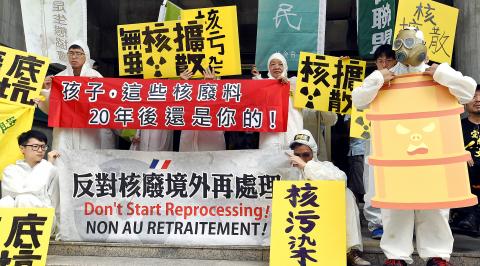Environmental groups yesterday rallied in front of the legislature in Taipei to protest Taiwan Power Co’s (Taipower) multi-billion US dollar project to reprocess highly radioactive nuclear fuel rods overseas, demanding lawmakers axe The company’s budget proposal at an ad hoc meeting today.
Taipower requested a budget of NT$11.25 billion (US$342.98 million) to manage 1,200 used fuel rods, or 8 percent of its total used rods, by international companies in June, but the legislature froze the budget for three months from June 11.
The budget proposal is to be reviewed by a special legislative panel today.

Photo: George Tsorng, Taipei Times
The 1,200 spent rods include 480 rods from the Jinshan Nuclear Power Plant in New Taipei City’s Shihmen District (石門) and 720 rods from the Guosheng Nuclear Power Plant in the city’s Wanli District (萬里), Taipower said.
Green Citizens’ Action Alliance deputy secretary-general Hung Shen-han (洪申翰) said that Taipower’s plan to reprocess nuclear waste overseas is not a permanently viable option, as fuel rods — after reusable plutonium and uranium are extracted — would be shipped back to Taiwan 20 years after they are reprocessed, according to Taipower’s tender contract.
Taiwan is likely to still be faced with the challenge of finding a dump site to store the nuclear waste by then, Hung said.
Taipower’s plan is actually a means to extend the service life of the Jinshan and Guosheng plants, as the spent fuel pools at the plants are nearing capacity, he said.
Citing Atomic Energy Council statistics, Citizen of the Earth office director Tsai Chung-yueh (蔡中岳) said that it would take 10,000 years for high-level radioactive nuclear waste to decay to background levels.
Suggesting that the mostly likely bidder of Taipower’s project would be a French company, alliance member Wu Cheng-cheng (吳澄澄) said that France had promulgated a law prohibiting storage of imported nuclear waste in French soil and stipulating that companies must return imported nuclear waste to its nation of origin after processing.
Wu said that there would be about 23,000 spent fuel rods when the nation’s three operating nuclear power plants are decommissioned, and it would cost NT$215.78 billion for them to be processed abroad.
Protesters called on the legislature to scrap Taipower’s budget proposal and re-examine the nation’s energy policy.
However, Taipower said that the plan is a small-scale pilot project to test the feasibility of reprocessing used fuel rods overseas, which might serve as an alternative to existing nuclear waste management methods and a backup plan if the dry-storage facilities at the Jinshan and Guosheng plants are full.
The project would prevent an early decommissioning of the two plants before they reach a 40-year lifespan, which would cause the nation lose 25 million kilowatt-hours of electricity every year, affecting power resources in the nation’s north, the company said.

ANOTHER EMERGES: The CWA yesterday said this year’s fourth storm of the typhoon season had formed in the South China Sea, but was not expected to affect Taiwan Tropical Storm Gaemi has intensified slightly as it heads toward Taiwan, where it is expected to affect the country in the coming days, the Central Weather Administration (CWA) said yesterday. As of 8am yesterday, the 120km-radius storm was 800km southeast of Oluanpi (鵝鑾鼻), Taiwan’s southernmost tip, moving at 9kph northwest, the agency said. A sea warning for Gaemi could be issued tonight at the earliest, it said, adding that the storm is projected to be closest to Taiwan on Wednesday or Thursday. Gaemi’s potential effect on Taiwan remains unclear, as that would depend on its direction, radius and intensity, forecasters said. Former Weather Forecast

As COVID-19 cases in Japan have been increasing for 10 consecutive weeks, people should get vaccinated before visiting the nation, the Centers for Disease Control (CDC) said. The centers reported 773 hospitalizations and 124 deaths related to COVID-19 in Taiwan last week. CDC Epidemic Intelligence Center Director Guo Hung-wei (郭宏偉) on Tuesday said the number of weekly COVID-19 cases reported in Japan has been increasing since mid-May and surpassed 55,000 cases from July 8 to July 14. The average number of COVID-19 patients at Japan’s healthcare facilities that week was also 1.39 times that of the week before and KP.3 is the dominant

The Chinese Communist Party’s (CCP) working group for Taiwan-related policies is likely to be upgraded to a committee-level body, a report commissioned by the Mainland Affairs Council (MAC) said. As Chinese President Xi Jinping (習近平) is increasingly likely to upgrade the CCP’s Central Leading Group for Taiwan Affairs, Taiwanese authorities should prepare by researching Xi and the CCP, the report said. At the third plenary session of the 20th Central Committee of the CCP, which ended on Thursday last week, the party set a target of 2029 for the completion of some tasks, meaning that Xi is likely preparing to

US-CHINA TRADE DISPUTE: Despite Beijing’s offer of preferential treatment, the lure of China has dimmed as Taiwanese and international investors move out Japan and the US have become the favored destinations for Taiwanese graduates as China’s attraction has waned over the years, the Ministry of Labor said. According to the ministry’s latest income and employment advisory published this month, 3,215 Taiwanese university graduates from the class of 2020 went to Japan, surpassing for the first time the 2,881 graduates who went to China. A total of 2,300 graduates from the class of 2021 went to the US, compared with the 2,262 who went to China, the document showed. The trend continued for the class of 2023, of whom 1,460 went to Japan, 1,334 went to